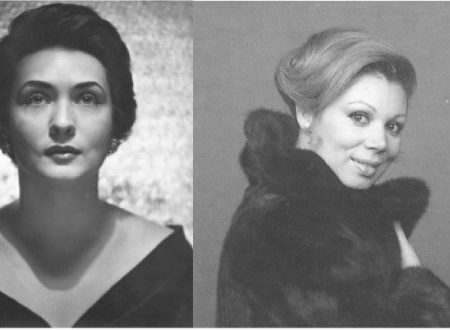Introduction
COMMEMORATING VICTORIA DE LOS ÁNGELES
AT THE CENTENARY OF HER BIRTH
The great Catalan Spanish soprano Victoria de los Angeles, one of the most highly eulogised artists in opera and recital history, was born 100 years ago on the 1st of November 1923 – just one month before the vastly different soprano Maria Callas. To commemorate her art and assess her exceptional versatility, the internationally acclaimed opera scholar Roger Pines and the internationally extolled baritone and pedagogue Thomas Hampson discuss her legacy, with recordings spanning much of her career.
The feature was produced by Jon Tolansky.
Music Items in this Feature
GOUNOD, FAUST
Excerpt: Jewel Song
PUCCINI, LA BOHÈME
Excerpt: “O soave fanciulla”
with Jussi Björling, conductor Thomas Beecham
MASSENET, MANON
Excerpt: “Hélas, l’oiseau qui fuit…N’est-ce plus ma main”
with Henri Legay, conductor Pierre Monteux
ROSSINI, IL BARBIERE DI SIVIGLIA
Excerpt: “Una voce poco fa”
BIZET, CARMEN
Excerpt: “Voyons, que j’essaie à mon tour”
with Denise Monteil and Monique Linval, conductor Thomas Beecham
WAGNER, TÄNNHAUSER
Excerpt: “Dich, teure Halle”
PURCELL, DIDO AND AENEAS
“When I am laid in earth”
RAVEL, SHEHERAZADE
La flûte enchantée”
BRAHMS, FIVE ROMANCES AND SONGS (Op. 84)
Vergebliches Ständchen
FALLA, LA VIDA BREVE
“Allí está!”
GIMÉNEZ, LA TEMPRANICA
“Zapateado”
FRANCISCO ORTEGA (attr.)
“Pues que me tienes, Miguel”
GRANADOS, TONADILLAS
“La maja dolorosa III”
BARRERA & GÓMEZ, EMIGRANTES
“Adios, Granada”
CANTELOUBE, CHANTS D’AUVERGNE
“L’aio de rotso”
Charles Gounod, FAUST
Jewel Song: “Oh, Dieu, que de bijoux!”
After agreeing to give his soul to the devil in exchange for youth, the aged Faust is transformed into a handsome young man. In the town square, he sees lovely Marguerite and falls instantly in love with her. In the garden of Marguerite’s home, the devil conjures up a box of jewels, which Faust leaves for Marguerite. When she returns home, she finds the box, opens it, and is completely dazzled by the jewels. In her captivating aria, she adorns herself with them, feeling as if she’s suddenly become a lady. She wishes that Faust were there and wonders if he would find her beautiful.
Giacomo Puccini, LA BOHÈME
“O soave fanciulla”
Alone on Christmas night in the garret where he lives, Rodolfo, an impoverished poet, is surprised when a neighbor, the lovely but fragile Mimì, knocks at the door. Her candle has gone out, and she’s also lost her key. In the dark, as he searches for her key, Rodolfo touches Mimì’s hand. He tells her about his life, and she responds by telling him that she’s a seamstress who longs for the return of spring. In their soaring duet, “O soave fanciulla” (“Oh, sweet girl”), Rodolfo is enraptured as he sees Mimì in the moonlight. They decide to join Rodolfo’s roommates at a nearby café.
Jules Massenet, MANON
“N’est-ce plus ma main”
At a country inn, Chevalier Des Grieux meets a captivating young woman, Manon Lescaut, who is being sent by her family to a convent. The two run away together to Paris, but they haven’t much money to live on. Longing for luxury, Manon leaves Des Grieux and becomes the mistress of the nobleman De Brétigny. Hearing that Des Grieux is about to become a priest, Manon rushes to the seminary to get him back. When he sees her, he’s powerless to resist the allure of her exquisite aria: “Isn’t this my hand? How it’s pressing! Isn’t this my voice?” He finally yields to her, declaring, “My life is in your heart! My heart is in your eyes! Ah, Manon, I love you!”
Gioachino Rossini, IL BARBIERE DI SIVIGLIA
“Una voce poco fa”
In The Barber of Seville, the first music heard from the heroine, Rosina, is her aria, in which she declares that she just heard a voice and it resounded in her heart. That voice belongs to Lindoro, the young man who’s been serenading her outside her window. “Yes, Lindoro will be mine,” she asserts. In the second half of her entrancing aria, she admits that, although she can be very gentle and sweet, but she can be a viper when anyone tries to prevent her from getting what she wants!
Georges Bizet, CARMEN
Card Aria: “En vain pour éviter”
Carmen’s friends have been using tarot cards to tell their fortunes. For one, the future is all about finding true love, while for the other it’s about marrying a rich old man and then, when he dies, inheriting his money. When Carmen tries the cards, they reveal death, as she sings in her “Card Aria” – death for her, and then for Don José, the violently jealous lover she’s trying to cast off. She realizes that, no matter how many times she shuffles and reshuffles the cards, the one that she turns up will always be the death card.
Richard Wagner, TANNHÄUSER
“Dich, teure Halle”
The minstrel Tannhäuser had left the Hall of Song – and the saintly Elisabeth, who loves him – in favor of joining the goddess Venus in her decadent lair. But now Tannhäuser, having grown weary of Venus, is returning to the Hall. In her ecstatic entrance aria, Elisabeth greets the Hall. She remembers how bleak it seemed to her when Tannhäuser was gone, and now she’s thrilled at the thought of seeing him again.
Henry Purcell, DIDO AND AENEAS
Dido’s Lament: “When I am laid in earth”
Dido, Queen of Carthage, has fallen in love with the Trojan hero, Aeneas, and he with her. But Aeneas believes the gods are calling him away, so that he can found a new Troy (that is, what will become the city of Rome). Dido is consumed by rage and despair that he would ever consider leaving her. After he departs, she knows that death will await her. Turning to her faithful handmaiden, Belinda, she sings her dignified, profoundly moving lament: “When I am laid in earth, may my wrongs create no trouble in thy breast. Remember me, but ah, forget my fate!”
Maurice Ravel, SHÉHÉRAZADE
“La flûte enchantée”
Set to poems by Tristan Klingsor, Ravel’s "Shéhérazade" consists of three colorful and enticing songs, of which the second is “La flute enchantée” – “The Enchanted Flute.” In the song, the singer praises the handsomeness of a certain young man whom she invites into her home. The invitation is refused and she watches the young man walk away with a graceful wave of his hand. (The flute of the song’s title remains unmentioned in the text.)
Johannes Brahms, FIVE ROMANCES AND SONGS (Op. 84)
“Vergebliches Ständchen”
“The Futile Serenade” is one of the most popular of Brahms’s 200 songs. The young lover is outside his beloved’s house, it’s snowing, and he’s longing to get in, but the object of his affection declares that her door is closed and she can’t let him enter. He complains about the snow, but she admonishes him, “Let your love be extinguished, and if it keeps dying, then just go home to bed. Good night, my lad!”
Manuel de Falla, LA VIDA BREVE
“Allí está!”
The ill-fated heroine of "La vida breve" – “The Brief Life” -- is Salud, a poor girl who loves Paco, who’s about to marry a rich girl. In her intensely passionate, heartrending aria, she sees the two outside her window, celebrating their wedding, and she laments how she’s suffering.
Gerónimo Giménez, LA TEMPRANICA
“Zapateado”
Grabié is a teenager who works for a blacksmith, and the song is sung purely as entertainment for a visiting English gentleman, Mr. James. It’s a song about a tarantula – how evil it is, and how it stung Grabié. He concludes, “Dancing is the only cure for this terrible pain!”
FRANCISCO ORTEGA (attributed)
“Pues que me tienes, Miguel”
The text is anonymous, and this song dates from the Renaissance. A translation of the text is as follows: "Well, you have me, Miguel, for your wife, / Look at me, Miguel, how beautiful I am. / So advantageous, how beautiful and graceful / Look at me, Miguel, how beautiful I am. / Look how amazing nature made me! / How much beauty is locked up in me!"
Enrique Granados, TONADILLAS
“La maja dolorosa III”
In this achingly intimate and soulful song, a young woman singing this song is recalling a lover who, we must assume, has left her. She remembers everything about him: “I gave my life to him,” she says, “and I’d give a thousand more lives to him if he wanted me to.”
Tomás Barrera & Rafael Calleja Gómez, EMIGRANTES
“Adios, Granada”
In this mesmerizing song, the singer, who so loves Granada, is now bidding farewell to it, and is deeply saddened at the thought of not seeing it again. He aches that he’ll now be so far away from Granada’s valley, and from the grave of his dark-haired beloved.
Joseph Canteloube (arr.), CHANTS D’AUVERGNE
“L’aïo de rótso”
One of the liveliest of Canteloube’s celebrated arrangements of Auvergne songs, “Spring Water” finds the singer scolding a child, insisting that the water from the spring will kill that child. Better advice, says the singer, is to drink wine instead of water! The thought here is that if a girl gets married, she should make sure not to drink spring water, since she’ll be much better at lovemaking after drinking some wine.



